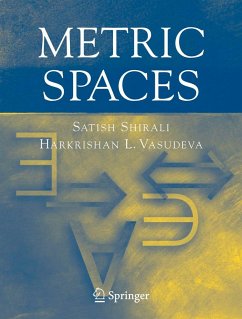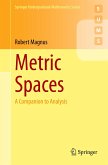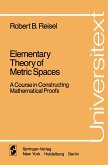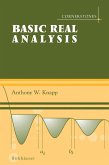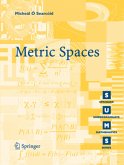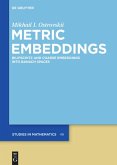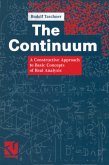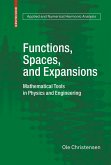Since the last century, the postulational method and an abstract point of view have played a vital role in the development of modern mathematics. The experience gained from the earlier concrete studies of analysis point to the importance of passage to the limit. The basis of this operation is the notion of distance between any two points of the line or the complex plane. The algebraic properties of underlying sets often play no role in the development of analysis; this situation naturally leads to the study of metric spaces. The abstraction not only simplifies and elucidates mathematical ideas that recur in different guises, but also helps eco- mize the intellectual effort involved in learning them. However, such an abstract approach is likely to overlook the special features of particular mathematical developments, especially those not taken into account while forming the larger picture. Hence, the study of particular mathematical developments is hard to overemphasize. The language inwhich a large body of ideas and results of functional analysis are expressed is that of metric spaces. The books on functional analysis seem to go over the preliminaries of this topic far too quickly. The present authors attempt to provide a leisurely approach to the theory of metric spaces. In order to ensure that the ideas take root gradually but firmly, a large number of examples and counterexamples follow each definition. Also included are several worked examples and exercises. Applications of the theory are spread out over the entire book.
From the reviews:
"This volume provides a complete introduction to metric space theory for undergraduates. It covers the typology of metric spaces, continuity, connectedness, compactness and product spaces ... . The material is developed at a leisurely pace and applications of the theory are discussed throughout, making this book ideal as a classroom text for third- and fourth-year undergraduates or as a self-study resource for graduate students and researchers." (L'Enseignement Mathematique, Vol. 51 (3-4), 2005)
"This book on metric spaces was written by authors whose main field is analysis. Therefore its focus lies on those parts of the theory of metric spaces which are mainly used in (functional) analysis. ... Altogether this is an interesting book for those who will continue their studies in analysis." (H. Brandenburg, Zentralblatt Math, Vol. 1095 (21), 2006)
"This book introduces the fundamentals of analysis in metric spaces. It's writtenin a very spare theorem-proof-example style; has illustrative examples and exercises; spends little time on discussion, development of intuition, or substantial applications; begins by stating that the abstract postulational method has a vital role in modern mathematics; implicitly assumes this is the way to teach mathematics. Useful resource for writing lectures? Certainly." (Donald Estep, SIAM Review, Vol. 49 (2), 2007)
"This volume provides a complete introduction to metric space theory for undergraduates. It covers the typology of metric spaces, continuity, connectedness, compactness and product spaces ... . The material is developed at a leisurely pace and applications of the theory are discussed throughout, making this book ideal as a classroom text for third- and fourth-year undergraduates or as a self-study resource for graduate students and researchers." (L'Enseignement Mathematique, Vol. 51 (3-4), 2005)
"This book on metric spaces was written by authors whose main field is analysis. Therefore its focus lies on those parts of the theory of metric spaces which are mainly used in (functional) analysis. ... Altogether this is an interesting book for those who will continue their studies in analysis." (H. Brandenburg, Zentralblatt Math, Vol. 1095 (21), 2006)
"This book introduces the fundamentals of analysis in metric spaces. It's writtenin a very spare theorem-proof-example style; has illustrative examples and exercises; spends little time on discussion, development of intuition, or substantial applications; begins by stating that the abstract postulational method has a vital role in modern mathematics; implicitly assumes this is the way to teach mathematics. Useful resource for writing lectures? Certainly." (Donald Estep, SIAM Review, Vol. 49 (2), 2007)

